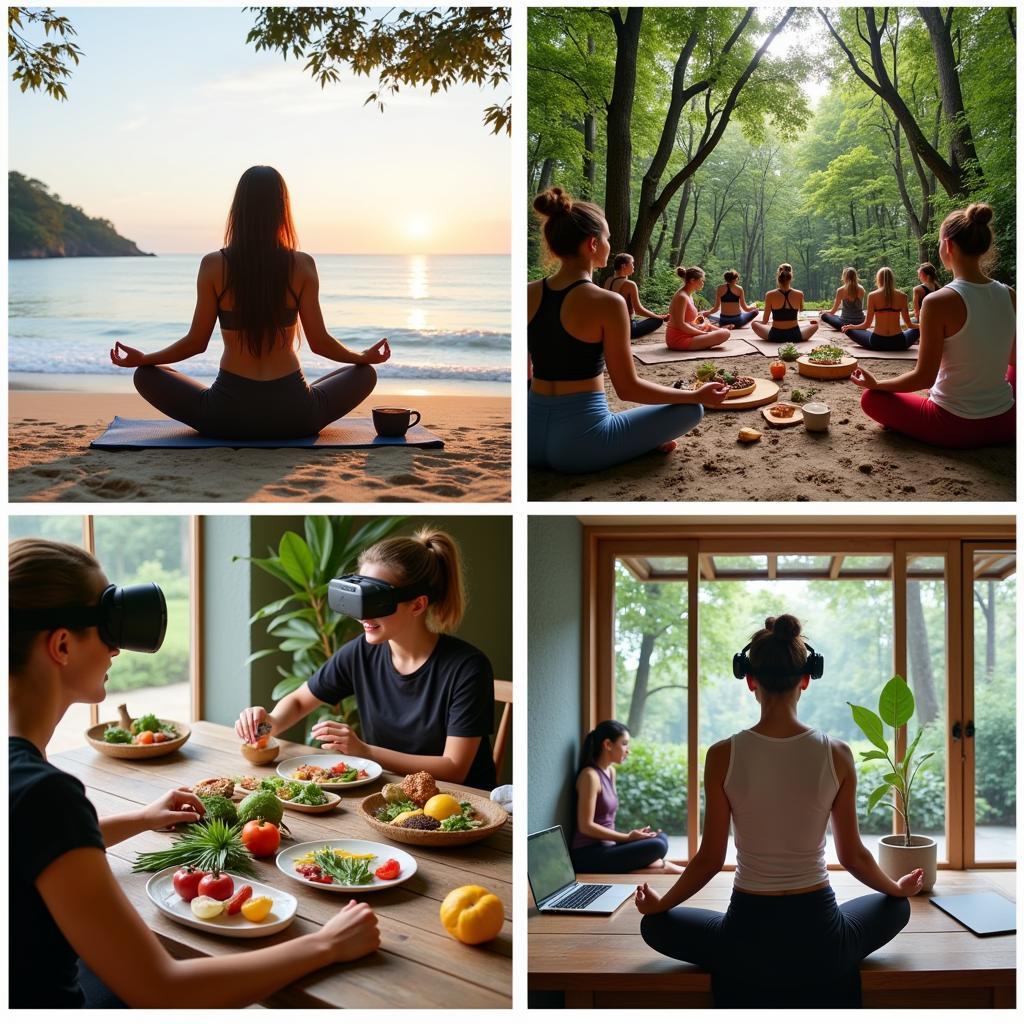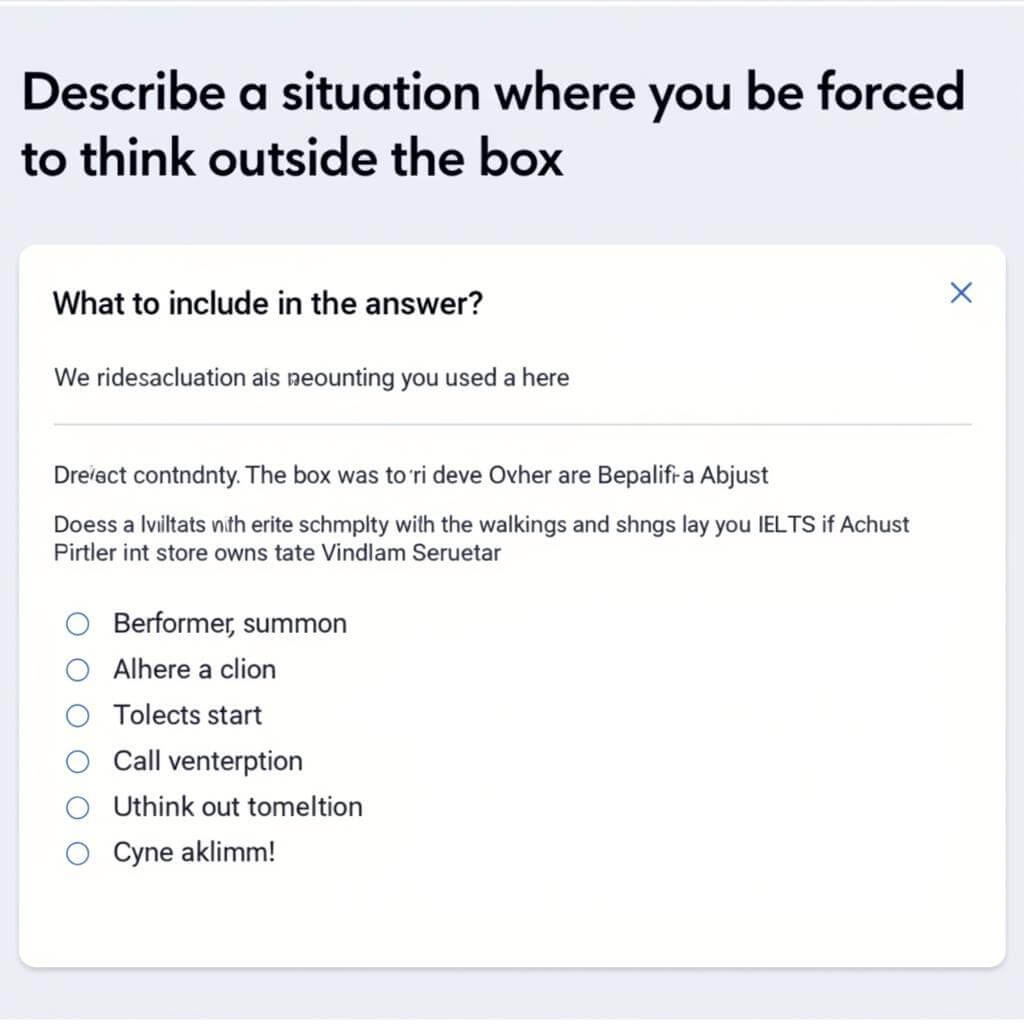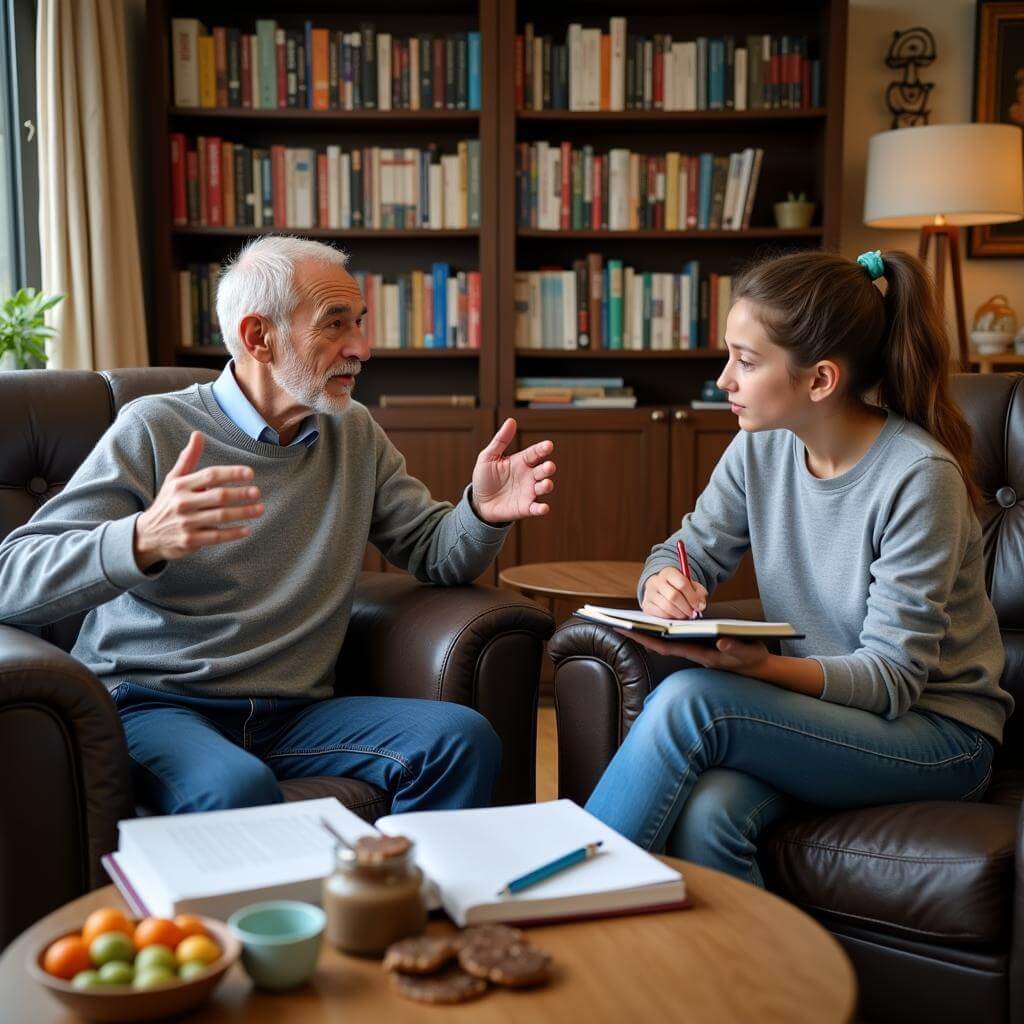The topic of describing a place for a retreat is a popular one in IELTS Speaking exams. It allows candidates to showcase their descriptive language skills and ability to express personal preferences. This theme has appeared frequently in past tests and is likely to remain relevant in future exams. Let’s explore how to effectively tackle this topic and impress the examiner.
Part 1: Introduction and Interview
In this section, the examiner may ask general questions about relaxation and travel. Here’s a sample question with a suggested response:
Examiner: Do you like to travel to relax?
Sample answer (Band 7-8):
“Absolutely! I find traveling to be one of the most effective ways to unwind and recharge. There’s something truly refreshing about breaking away from my daily routine and immersing myself in new surroundings. Whether it’s exploring a bustling city or retreating to a tranquil natural setting, the change of scenery always helps me relax and gain a fresh perspective on life.”
Describe a special place in nature you visit to relax
Part 2: Long Turn
In this section, you’ll be given a cue card with a topic to speak about for 1-2 minutes. Here’s a sample cue card related to our theme:
Describe a place where you would go for a retreat
You should say:
- Where this place is
- What it looks like
- What activities you can do there
- And explain why you would choose this place for a retreatSample answer (Band 6-7):
“I’d like to talk about a peaceful mountain resort in the countryside that I consider perfect for a retreat. It’s located about a three-hour drive from my city, nestled in a lush valley surrounded by pine forests.
The resort consists of cozy wooden cabins scattered across the hillside, each offering stunning views of the mountains. There’s also a central lodge with a restaurant and common areas for guests to gather.
As for activities, there are numerous hiking trails of varying difficulty levels, allowing visitors to explore the beautiful natural surroundings. The resort also offers yoga and meditation classes, which are ideal for relaxation. In the evenings, guests can gather around a bonfire and stargaze.
I would choose this place for a retreat because it provides the perfect balance of tranquility and activity. The serene environment helps me disconnect from the stresses of daily life, while the various activities ensure I can stay engaged and rejuvenated. The fresh mountain air and beautiful scenery also contribute to a sense of peace and well-being that I find essential for a truly restorative retreat.”
Sample answer (Band 8-9):
“I’d like to describe an idyllic coastal sanctuary that I consider the epitome of a perfect retreat destination. This hidden gem is nestled along a secluded stretch of coastline in [country name], approximately a four-hour journey from the nearest major city.
The retreat center is a harmonious blend of modern eco-friendly architecture and traditional local design. Low-impact structures are thoughtfully integrated into the natural landscape, featuring floor-to-ceiling windows that frame breathtaking vistas of the ocean and surrounding cliffs. The accommodation ranges from minimalist yet luxurious individual cottages to communal lodges that foster a sense of community among guests.
This retreat offers a diverse array of activities catering to both physical and mental well-being. Invigorating yoga sessions are conducted on platforms overlooking the sea, while guided meditation walks along pristine beaches allow for deep introspection. For those seeking more active pursuits, there are opportunities for kayaking in crystal-clear waters, exploring hidden coves, and hiking along scenic coastal trails. The retreat also offers workshops on sustainable living and local culinary classes that showcase the region’s organic produce.
I would opt for this location as my ideal retreat for several compelling reasons. Firstly, the juxtaposition of the vast ocean and rugged cliffs creates an environment that is both awe-inspiring and grounding, perfect for fostering a sense of perspective and inner calm. The thoughtfully curated activities strike an ideal balance between structured self-improvement and free exploration, allowing guests to tailor their experience to their personal goals. Moreover, the retreat’s commitment to sustainability aligns with my values, enabling me to rejuvenate myself while also supporting environmentally responsible practices. Ultimately, this coastal haven provides the perfect setting to disconnect from the cacophony of modern life, reconnect with nature, and embark on a journey of self-discovery and renewal.”
 Eco-friendly coastal retreat center with stunning ocean views
Eco-friendly coastal retreat center with stunning ocean views
Follow-up questions:
- What kind of activities do you find most relaxing during a retreat?
- How important is the natural environment in choosing a retreat location?
Sample answer for question 1 (Band 8-9):
“For me, the most rejuvenating activities during a retreat are those that allow for a harmonious balance between physical engagement and mental tranquility. I find guided meditation sessions particularly beneficial, as they help me cultivate mindfulness and achieve a deep sense of inner peace. Additionally, immersive nature walks or forest bathing experiences are incredibly restorative, allowing me to reconnect with the natural world and gain perspective on my daily concerns. Engaging in gentle yoga practices, especially at sunrise or sunset, not only enhances physical flexibility but also promotes mental clarity and emotional balance. Ultimately, I believe the most effective retreat activities are those that facilitate a profound disconnection from everyday stressors while simultaneously fostering a meaningful connection with oneself and the surrounding environment.”
Part 3: Two-way Discussion
In this section, the examiner will ask more abstract questions related to the topic. Here’s a sample question and response:
Examiner: How do you think the concept of ‘retreat’ has changed in recent years?
Sample answer (Band 7-8):
“I believe the concept of retreat has evolved significantly in recent years. Traditionally, retreats were often associated with religious or spiritual practices, typically involving isolation and intense introspection. However, in today’s fast-paced world, the idea of a retreat has broadened to encompass a wider range of experiences.
Nowadays, retreats are increasingly seen as opportunities for personal growth, skill development, and holistic well-being. Many modern retreats offer a mix of activities catering to physical, mental, and emotional health. For example, you might find retreats that combine yoga and meditation with workshops on topics like nutrition, creativity, or professional development.
Describe an ideal place you would like to stay
Another notable change is the integration of technology. While some retreats still emphasize complete digital detox, others are incorporating tech in innovative ways, such as offering virtual reality meditation experiences or using apps to track personal progress.
Moreover, there’s been a shift towards more accessible and shorter retreat options. Weekend retreats or even day-long urban retreats have become popular, catering to those who can’t commit to longer periods away from their daily responsibilities.
Lastly, there’s an increasing emphasis on sustainability and eco-consciousness in retreat design and operation. Many retreats now focus on minimizing their environmental impact and educating participants about sustainable living practices.
In essence, the modern concept of a retreat has become more diverse, flexible, and aligned with contemporary lifestyles and values.”
Sample answer (Band 8-9):
“The evolution of the ‘retreat’ concept in recent years has been quite profound and multifaceted. Traditionally, retreats were often synonymous with ascetic practices or religious seclusion, primarily focused on spiritual contemplation and detachment from worldly affairs. However, the contemporary notion of a retreat has undergone a significant paradigm shift, adapting to the complex needs and aspirations of modern individuals.
In today’s context, retreats have morphed into multidimensional experiences that cater to a holistic view of well-being. They now often incorporate elements of personal development, professional growth, and even adventure tourism. This shift reflects a broader societal recognition of the interconnectedness between physical, mental, and emotional health.
One notable trend is the rise of specialized retreats targeting specific demographics or interests. For instance, we now see entrepreneurial retreats focusing on innovation and networking, artistic retreats for creative exploration, or wellness retreats centered around specific health goals or alternative therapies. This diversification caters to a more individualized approach to self-improvement and relaxation.
Describe a place in your country that is famous for its nature
Another significant change is the integration of technology, which might seem paradoxical to the traditional retreat concept. While some retreats still emphasize a complete digital detox, others are leveraging technology to enhance the retreat experience. This could range from apps guiding meditation practices to virtual reality experiences simulating serene environments, or even wearable tech monitoring stress levels and sleep patterns during the retreat.
The accessibility and duration of retreats have also evolved. We’re seeing a rise in micro-retreats or urban day retreats, catering to individuals who can’t commit to extended periods away from their responsibilities. This trend acknowledges the challenges of modern life while still providing opportunities for rejuvenation.
Furthermore, there’s been a marked shift towards sustainability and environmental consciousness in retreat design and operation. Many retreats now not only aim to minimize their ecological footprint but also educate participants on sustainable living practices, fostering a sense of environmental stewardship.
Lastly, the global pandemic has accelerated the trend of virtual retreats, demonstrating the adaptability of the concept. These online experiences aim to recreate the retreat atmosphere in a digital space, offering guided practices, group interactions, and even simulated environments.
In essence, the modern retreat concept has become more inclusive, adaptable, and aligned with contemporary values and lifestyles. It reflects a growing recognition of the need for regular self-care and personal development in our increasingly complex and demanding world.”
 Diverse activities offered in modern retreats
Diverse activities offered in modern retreats
Key Vocabulary and Phrases for High Scores
-
Idyllic /aɪˈdɪlɪk/ (adjective): Extremely pleasant, peaceful, or picturesque.
Example: The retreat was set in an idyllic coastal location. -
Rejuvenate /rɪˈdʒuːvəneɪt/ (verb): To give new energy or vigor to; revitalize.
Example: A week at the mountain retreat completely rejuvenated me. -
Serenity /səˈrenəti/ (noun): The state of being calm, peaceful, and untroubled.
Example: The serenity of the natural surroundings helped me relax deeply. -
Immerse /ɪˈmɜːrs/ (verb): To involve oneself deeply in a particular activity or interest.
Example: I immersed myself in the local culture during my retreat. -
Holistic /həʊˈlɪstɪk/ (adjective): Characterized by the treatment of the whole person, taking into account mental and social factors, rather than just physical symptoms.
Example: The retreat offered a holistic approach to wellness, addressing body, mind, and spirit.
Describe a place in your city where you go to relax
Using these words and phrases in your responses can demonstrate a rich vocabulary and help you achieve a higher band score in the IELTS Speaking test.
Examiner’s Advice
To excel in the IELTS Speaking test, particularly when describing a retreat location:
- Use vivid and descriptive language to paint a clear picture of the place.
- Incorporate a range of vocabulary, including less common words and idiomatic expressions.
- Vary your sentence structures to demonstrate linguistic flexibility.
- Speak fluently and coherently, using appropriate linking words to connect your ideas.
- Show enthusiasm and personal engagement with the topic to make your response more convincing and natural.
Remember, practice is key. Regularly describing places and experiences will help you become more comfortable and proficient in this type of task.
 IELTS candidate practicing speaking with an examiner
IELTS candidate practicing speaking with an examiner
By following these guidelines and incorporating the sample answers and vocabulary provided, you’ll be well-prepared to tackle questions about retreat locations in your IELTS Speaking test. Good luck with your exam preparation!


